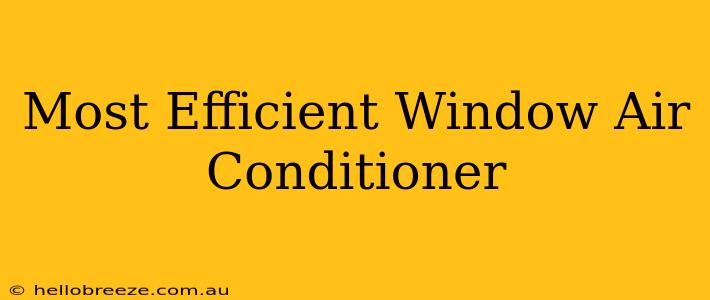Summer heat got you down? Finding the most efficient window air conditioner can dramatically improve your comfort and lower your energy bills. This guide will help you navigate the world of window units and choose the perfect energy-saving model for your needs.
Understanding Energy Efficiency in Window AC Units
Before diving into specific models, it's crucial to understand how efficiency is measured. The Energy Efficiency Ratio (EER) and Seasonal Energy Efficiency Ratio (SEER) are key metrics.
-
EER: This measures the cooling output (in British Thermal Units or BTUs) per watt of electricity consumed. A higher EER indicates greater efficiency. Look for EER ratings of 12 or higher for optimal performance.
-
SEER: This is a more comprehensive rating that considers the unit's efficiency over an entire cooling season. Higher SEER ratings (12 or above is a good starting point, with some reaching over 15) signify significant long-term energy savings.
Choosing a window AC with a high EER and SEER rating is the first step towards significant savings on your electricity bills.
Factors to Consider When Choosing an Efficient Window AC
Beyond energy efficiency ratings, several other factors influence your choice:
1. BTU Capacity: Sizing Matters
The BTU (British Thermal Unit) rating indicates the cooling capacity of the unit. Choosing the right size is critical. A unit that's too small will struggle to cool your room, while one that's too large will cycle on and off frequently, wasting energy and potentially leading to uncomfortable temperature fluctuations.
To determine the appropriate BTU capacity, consider:
- Room size: Larger rooms require higher BTU ratings.
- Insulation: Well-insulated rooms need less cooling power.
- Number of windows and doors: More openings mean more heat gain.
- Climate: Hotter climates demand higher BTU capacity.
Use an online BTU calculator or consult a professional for accurate sizing.
2. Features for Enhanced Efficiency
Many modern window AC units offer features designed to boost efficiency:
- Energy-saving modes: These automatically adjust cooling based on your preferences, optimizing energy consumption.
- Programmable timers: Allows you to set on/off times to avoid running the AC when you're away.
- Sleep mode: Gradually increases the temperature during the night to save energy while ensuring comfortable sleep.
- Variable-speed fans: Offer precise temperature control and reduce energy waste associated with constant high-speed operation.
- Smart features (optional): Some models integrate with smart home systems, allowing you to control the unit remotely and monitor energy usage.
While these features add to the initial cost, the long-term energy savings often outweigh the investment.
3. Noise Level: A Key Consideration
While efficiency is paramount, excessive noise can be a major drawback. Check the decibel rating (dB) of the unit. Lower dB ratings signify quieter operation.
Top Brands Known for Efficiency
Several brands consistently produce high-efficiency window air conditioners. Research models from these manufacturers to find the best fit for your needs and budget:
- LG: Known for innovative features and robust performance.
- Whirlpool: A trusted brand with a wide range of models.
- GE: Offers a balance of features and affordability.
Installation and Maintenance for Optimal Efficiency
Proper installation and regular maintenance are vital for maintaining peak efficiency:
- Proper installation: Ensure the unit is securely installed according to the manufacturer's instructions to prevent air leaks and maximize cooling power.
- Regular filter cleaning: Clean or replace air filters regularly to prevent restricted airflow and reduce the strain on the compressor.
- Regular maintenance: Schedule professional maintenance checks annually to ensure optimal performance and prevent potential problems.
By carefully considering the factors discussed above, you can find the most efficient window air conditioner to beat the heat while keeping your energy bills in check. Remember to prioritize EER and SEER ratings, choose the appropriate BTU capacity, and look for energy-saving features. A little research and planning can make a big difference in your comfort and your wallet this summer.

